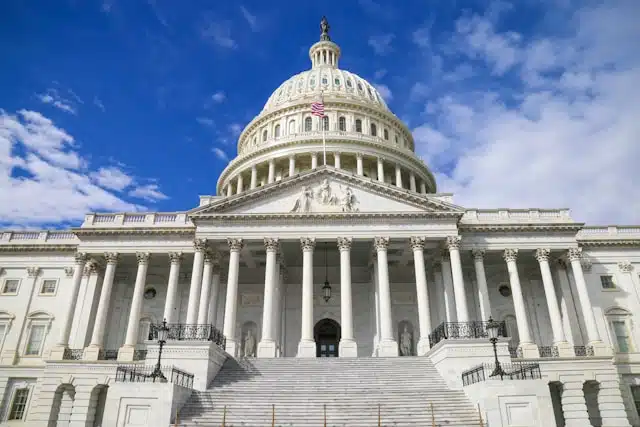The war over the proposed Credit Card Competition Act shows no signs of abating as combatants on both sides of the fence continue their efforts to sway legislators and public opinion on the matter of card-acceptance costs.
The latest battle centers on data from payments consultancy CMSPI that says merchants will save $16.4 billion annually in credit card acceptance fees from passage of the proposed legislation, up from an estimated $15 billion in 2023.
The increased savings come as the interchange fees merchants pay to accept credit cards surpassed $170 billion in 2023, costing the average family more than $1,100, according to estimates released by the Merchants Payments Coalition. The CCCA aims to cut acceptance costs by requiring issuers with $100 billion or more in assets to offer a choice of at least two networks for processing, with at least one network being other than Visa or Mastercard.

California merchants would see the biggest savings from the CCCA ($2.3 billion), followed by those in Texas ($1.5 billion), New York ($1.3 billion), Florida ($950.2 million), and Illinois ($651.5 million), the CMSPI says.
“Revenues from swipe fees go up annually and expected savings for merchants from passage of the CCCA grow proportionally,” says Doug Kantor, an MPC executive committee member and general counsel for the National Association of Convenience Stores.
To illustrate Kantor’s point, the MPC noted that, based on 2019 data, merchant savings on card-acceptance fees would total $11 billion annually.
In response, the Electronic Payments Coalition says CMSPI’s findings contradict a pair of reports from the Congressional Research Service and the University of Miami casting doubt on merchants’ cost savings from the CCCA.
“CMSPI findings contradict findings from the Congressional Research Service, which questioned who would benefit from the CCCA, and a University of Miami report that concluded small businesses would see no savings from the CCCA,” says an EPC spokesperson. “It has also been shown that when large retailers see caps on interchange, the savings are not passed along.”
The MPC’s Kantor counters that the Congressional Research Service report raised more questions than answers. “A lot of the data [from that report] has been cherry-picked by the EPC, which is intellectually dishonest, but the EPC does not object to being intellectually dishonest,” Kantor says.
Kantor adds the conclusions of the University of Miami study are “riddled with errors that run counter to reality.” Visa and Mastercard openly state that small merchants pay more in swipe than large merchants, he says. “Reforming this practice would undoubtably be better for small merchants,” Kantor says.
Sticking to its position, the EPC cited a study released earlier this week by the Small Business Payments Alliance, a trade organization formed last year by the EPC. The study found the majority of small businesses oppose new government mandates on payment networks. Instead, small businesses are more concerned with inflationary pressures than they are with the cost of processing credit cards, according to the study.
Some 48% of the 250 small-business decision makers surveyed by the SBPA say government regulation should stay the same, while 35% say it should decrease. In addition, 64% of respondents say the CCCA would benefit large retailers more than small businesses, while 60% say Congress is pushing through changes for the payments industry without considering the impact on their businesses.
“The message from small business owners is loud and clear: no new government mandates that would weaken the modern and secure electronic payments system,” an SBPA spokesperson says in statement. “The survey shows that small-business owners see the Durbin-Marshall credit card bill for what it is—needless government regulation that would benefit corporate megastores at the expense of small business.”
Counter punching, the MPC cites a monthly poll of 400 small businesses by the Job Creators Network Foundation that says 64% of small businesses polled are concerned about a rising cost of swipe fees. When asked whether they support the CCCA, 77% of respondents said yes, while 8% said no, and 14% said they were unsure.
“The EPC is running a fake group funded by the credit card industry and has put out a biased survey that dramatically contrasts with legitimate surveys taken by legitimate groups that actually represent small businesses. No one should be fooled by this credit card industry front group,” Kantor says by email.




